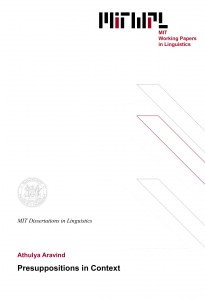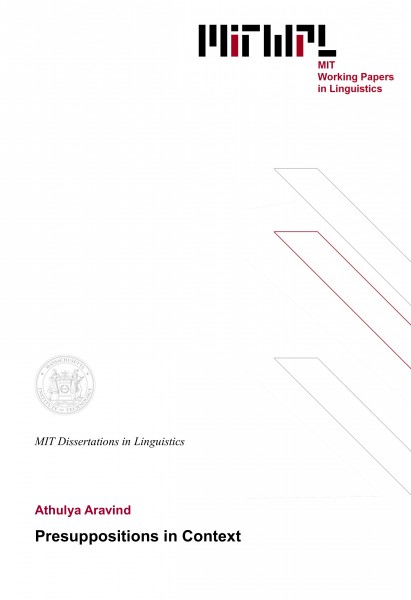Presuppositions in Context
Athulya Aravind, 2018
This dissertation is about the acquisition of presupposition. The specific focus is on the interplay between presuppositional content as hardwired in the semantics of particular expressions and the conversational contexts in which utterances containing those expressions may be used. A series of behavioral experiments examine what children in the preschool age range know about the pragmatic principles governing presupposition, and how they come to acquire this knowledge.
The dissertation is organized into two thematic halves. The first half investigates the conditions that govern when presupposing something is appropriate, hence allow for the use of a presupposition triggering expression. Specifically, I ask: do young children know the common ground requirement — the formal requirement that presuppositions be previ- ously established common knowledge — and do they know when and how this requirement can be violated? Two sets of experiments, using two presupposition-carrying expressions with importantly divergent properties (too and the), reveal that children, like adults, generate a default expectation that a presuppositional sentence be uttered to a listener who already takes for granted the presupposition. However, they hold onto this expectation even in circumstances where adult speakers do not. Unlike adults, children do not expect that an otherwise ‘neutral’ listener might accommodate a speaker’s informative presupposition. Together, these findings point to a developmental path where the formal requirement — that presuppositions be presuppositions — is acquired before an understanding that the rule can be bent and how. The second half examines the conditions that make marking of presuppositions obliga- tory, hence require the use of a presupposition triggering expression. Are children sensitive to Maximize Presupposition! (Heim 1991) as a principle governing competition and utterance choice? The ability to deploy Maximize Presupposition! in an adult-like way shows a more protracted developmental trajectory. Moreover, children’s ability to rule out presup- positionally weaker sentences seems to vary across competition environments. Taking the non-uniformity in development as signaling non-uniformity in the underlying phenomena, I develop an alternative account for a pair of expressions commonly thought to compete for Maximize Presupposition!: another vs. a. Ultimately, I suggest that Maximize Presupposition! is one of several pragmatic principles that lead to competition and selection of structures imposing the strongest contextual requirement. Children have command of some of these conditions, but not others. The acquisition trajectories are modulated by various factors, including the type of requirement imposed on the context (e.g. that some proposition is salient vs. accepted common belief) and the types of knowledge that are pre-requisites (e.g. knowledge of idiosyncratic properties of the lexicon). Thesis Supervisor: Martin Hackl Title: Associate Professor of Linguistics Thesis Supervisor: Daniel Fox Title: Anshen-Chomsky Professor of Language and Thought
